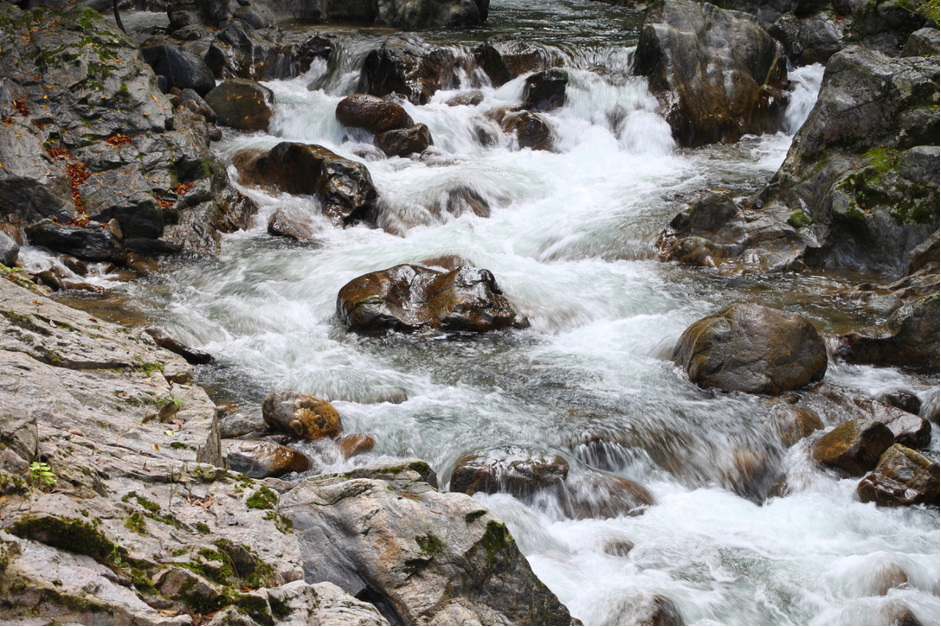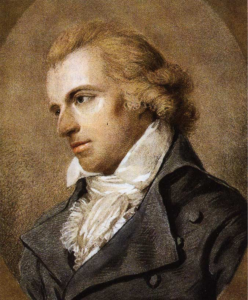The lad by the spring
(Poet's title: Der Jüngling am Bache)
Set by Schubert:
D 30
[September 24, 1812]
D 192
[May 15, 1815]
D 638
[April 1819]
An der Quelle saß der Knabe,
Blumen wand er sich zum Kranz,
Und er sah sie fortgerissen,
Treiben in der Wellen Tanz.
Und so fliehen meine Tage
Wie die Quelle rastlos hin,
Und so bleichet meine Jugend,
Wie die Kränze schnell verblühn.
Fraget nicht, warum ich traure
In des Lebens Blütenzeit!
Alles freuet sich und hoffet,
Wenn der Frühling sich erneut.
Aber diese tausend Stimmen
Der erwachenden Natur
Wecken in dem tiefen Busen
Mir den schweren Kummer nur.
Was soll mir die Freude frommen,
Die der schöne Lenz mir beut?
Eine nur ist’s, die ich suche,
Sie ist nah und ewig weit.
Sehnend breit ich meine Arme
Nach dem teuren Schattenbild,
Ach ich kann es nicht erreichen,
Und das Herz ist ungestillt.
Komm herab, du schöne Holde,
Und verlass dein stolzes Schloss.
Blumen, die der Lenz geboren,
Streu ich dir in deinen Schoß.
Horch! der Hain erschallt von Liedern,
Und die Quelle rieselt klar,
Raum ist in der kleinsten Hütte
Für ein glücklich liebend Paar.
A lad sat by the spring
Binding flowers into a wreath,
And he watched them being pulled away
Swirling in the dance of the waves.
“And that is how my days fly off
Without a rest, like this spring!
That is how my youth fades,
Just as quickly as blossoms on wreaths.
Do not ask why I am mourning
In the blossom time of life.
Everything enjoys itself and is hopeful
When spring renews itself.
But these thousand voices
Of awakening nature
Wake in the depths of my breast
Nothing but great misery.
How can I benefit from the joy
That this beautiful spring time offers?
There is only one person I am looking for,
She is close and infinitely distant.
Longingly, I reach out my arm
Towards the treasured shadowy image.
Oh, I cannot grasp it
And my heart has not been calmed!
Come down you beauty
And leave your proud castle!
Here are flowers, born of spring,
That I will strew in your lap.
Listen, the grove is resounding with songs
And the spring is trickling clearly.
There is space in the smallest of huts
For a happy loving couple.”
All translations into English that appear on this website, unless otherwise stated, are by Malcolm Wren. You are free to use them on condition that you acknowledge Malcolm Wren as the translator and schubertsong.uk as the source. Unless otherwise stated, the comments and essays that appear after the texts and translations are by Malcolm Wren and are © Copyright.
☙
Themes and images in this text:
Arms and embracing By water – river banks Castles and towers Chest / breast Dancing Fading and losing colour Flowers Huts Lap, womb (Schoß) Rivers (Bach) Songs (general) Spring (season) Springs, sources and fountains Voices Waves – Welle Woods – groves and clumps of trees (Hain)
Most inhabitants of central Europe in the 18th and early 19th centuries would never have seen the sea. Whenever they saw rivers, they could only imagine the vast distances the water still had to travel before it reached its destination. Such is the experience of youth, for whom old age and death seem ungraspably distant. The metaphor of the river as an image of human life reflects an emotional response to the passage of time as much as a one-to-one matching of the stages of life with the course of a stream. For young people, time rushes forward. Everything needs to happen immediately. For the elderly, those with less time left, there is comparatively little hurry.
The lad who sees this young river as an outward image of his inner life cannot just go with the flow. It is all happening too fast for him. He tries to take control of the situation by picking the flowers that burgeoning spring offers him and making a garland, but the energy of the river pulls it away and the flowers immediately fade. It is a funeral wreath as much as a wedding garland. Everything is so much more intense, so much more tragic, at that time of life. How can he imagine that spring will come again, that new flowers will blossom, that he might find a different love object? This loss is total. He has never seen a mature or an old river.
Schubert was only 15 when he first tackled this text. Like Schiller, its author, he was a central European whose experience of rivers was limited to the early and middle stages. He was to go on to set many, many more poems based on the same metaphor of human life as a river, and the fact that he returned to this particular text in 1815 and 1819 suggests that there is something about it that appealed to him deeply. He wanted to get it right. Part of the difficulty must have been dealing with the sudden change in mood towards the end of the text.
The imagery of the final stanza is based on shelter, on the world of culture as much as nature. The beloved is seen as ensconced high up in a castle or a palace, but the lad begs her to come down and share a lowly hut with him. In circumstances like this humans can attain sufficient distance from nature to allow themselves not to be totally controlled by it. The young river is no longer an unstoppable torrent carrying our youth and hopes away, but is part of the background music to a more controlled life. The lad is taking control of the situation. He is going to present the flowers directly to the beloved instead of just making daisy chains by a river and feeling sorry for himself. The dance of the waves which carried away those wasted flowers has given way to the songs of the trees. The river is now running clear.


☙
Original Spelling Der Jüngling am Bache An der Quelle saß der Knabe, Blumen wand er sich zum Kranz, Und er sah sie fortgerissen, Treiben in der Wellen Tanz. Und so fliehen meine Tage Wie die Quelle rastlos hin! Und so bleichet meine Jugend, Wie die Kränze schnell verblühn! Fraget nicht, warum ich traure In des Lebens Blüthenzeit! Alles freuet sich und hoffet, Wenn der Frühling sich erneut. Aber diese tausend Stimmen Der erwachenden Natur Wecken in dem tiefen Busen Mir den schweren Kummer nur. Was soll mir die Freude frommen, Die der schöne Lenz mir beut? Eine nur ists, die ich suche, Sie ist nah und ewig weit. Sehnend breit ich meine Arme Nach dem theuren Schattenbild, Ach ich kann es nicht erreichen, Und das Herz ist ungestillt! Komm herab, du schöne Holde, Und verlaß dein stolzes Schloß! Blumen, die der Lenz geboren, Streu ich dir in deinen Schooß. Horch, der Hain erschallt von Liedern Und die Quelle rieselt klar! Raum ist in der kleinsten Hütte Für ein glücklich liebend Paar.
Confirmed by Peter Rastl with Friedrich Schillers sämmtliche Werke. Zehnter Band. Enthält: Gedichte. Zweyter Theil. Wien, 1810. InCommission bey Anton Doll. [korrigierter Druck] pages 210-211; with Gedichte von Friederich Schiller, Zweiter Theil, Zweite, verbesserte und vermehrte Auflage, Leipzig, 1805, bei Siegfried Lebrecht Crusius, pages 338-340; and with Taschenbuch für Damen auf das Jahr 1805. Herausgegeben von Huber, Lafontaine, Pfeffel und anderen. Tübingen in der J. G. Cotta’schen Buchhandlung, pages 1-2.
To see an early version of the text, go to page 210 [216 von 310] here: http://digital.onb.ac.at/OnbViewer/viewer.faces?doc=ABO_%2BZ207858305


